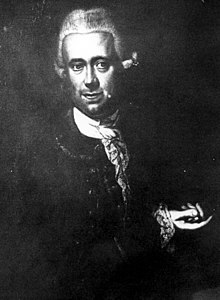Johann Christian Polycarp Erxleben
Johann Christian Polycarp Erxleben (born June 22, 1744 in Quedlinburg , † August 18, 1777 in Göttingen ) was a German scholar. His areas of expertise included physics, mineralogy, chemistry, veterinary medicine and natural history.
Life
From 1763 to 1767 Erxleben studied medicine at the Georg-August University . Like Georg Christoph Lichtenberg (1742–1799), he was a student of Abraham Gotthelf Kästner (1719–1800). After Erxleben received his Master's degree, he completed his habilitation and in 1775 received a professorship for physics and veterinary medicine at Göttingen University.
His scientific work includes Dijudicationem Systematum Animalium (1767), Beginnings of Nature (1768), considerations of the causes of the incompleteness of mineral systems (1768), Beginnings of Chemistry (1775), Introduction to Vieharzney Art (1769), considerations about the Study of Vieharzneykunst (1769) and history of my occupation with Vieharzneykunst (published by Zwierlein, 1798).
Erxleben was the founder of the Veterinary Institute ( Veterinary Institute of the Georg-August University of Göttingen ), the first and oldest university veterinary educational institution in Germany.
Since 1774 Erxleben belonged to the Society of Sciences in Göttingen (today's Academy of Sciences in Göttingen ), worked as a reviewer for the “Göttingen Scholars Advertisements” and in 1774/75 was responsible for the edition of the weekly “Charitable Treatises” . From the Göttingen publisher Johann Christian Dieterich (1722–1800) he soon took over the editing of the “Göttingen Pocket Calendar” founded in 1775 , which he handed over to Lichtenberg during his lifetime (1777).
His mother was the well-known Dorothea Christiane Erxleben , who was the first woman in Germany to receive a doctorate . Erxleben was married to Sophie Juliane Stromeyer (1751–1815) since 1770. The Marburg professor of law Johann Heinrich Christian Erxleben was his brother.
After Erxleben's death, Lichtenberg continued his lectures on experimental physics and published the 3rd to 6th edition of his "Beginnings of Nature" in an expanded version.
Works
- Johann Christian Polykarp Erxleben: Practical lessons in the art of cattle Harzney. Göttingen and Gotha (with Johann Christian Dieterich) 1771.
- The beginnings of chemistry . Dieterich, Göttingen 1775. ( Digitized edition of the University and State Library Düsseldorf )
- The beginnings of natural science . Sixth revised and enlarged edition. Dieterich, Göttingen 1794. Digitized edition of the Göttingen Digitization Center, digitized
literature
- Gerta Beaucamp: Johann Christian Polycarp Erxleben. Attempt a biography and bibliography. (= Lichtenberg studies, edited by Stefan Brüdermann and Ulrich Joost, vol. 9). Wallstein Verlag, Göttingen 1994
- Bertram Brenig: Johann Christian Polycarp Erxleben (1744-1777) - polymath, naturalist and veterinarian . Georgia-Augusta 72 (2000), pp. 35-44
- Abraham Gotthelf Kästner : Elogium Jo. Christiani Polycarpi Erxleben . In: Novi commentarii Societatis Regiae Scientiarum Gottingensis , Vol. VIII, 1778 ( digitized version )
- Georg Christoph Lichtenberg : Lectures on the theory of nature . Edited from G. Chr. Lichtenberg's annotated hand copy of the 4th edition by Johann Christian Polykarp Erxleben's “Beginnings of the Doctrine of Nature”, ed. vd Academy of Sciences in Göttingen. Wallstein Verlag, Göttingen 2005
- Eugen Lommel : Erxleben, Johann Christian Polykarp . In: Allgemeine Deutsche Biographie (ADB). Volume 6, Duncker & Humblot, Leipzig 1877, p. 335.
Web links
- Literature by and about Johann Christian Polycarp Erxleben in the catalog of the German National Library
Individual evidence
- ↑ Holger Krahnke: The members of the Academy of Sciences in Göttingen 1751-2001 (= Treatises of the Academy of Sciences in Göttingen, Philological-Historical Class. Volume 3, Vol. 246 = Treatises of the Academy of Sciences in Göttingen, Mathematical-Physical Class. Episode 3, vol. 50). Vandenhoeck & Ruprecht, Göttingen 2001, ISBN 3-525-82516-1 , pp. 7, 77.
| personal data | |
|---|---|
| SURNAME | Erxleben, Johann Christian Polycarp |
| ALTERNATIVE NAMES | Erxleben, Johann Christian |
| BRIEF DESCRIPTION | German scholar |
| DATE OF BIRTH | June 22, 1744 |
| PLACE OF BIRTH | Quedlinburg |
| DATE OF DEATH | August 18, 1777 |
| Place of death | Goettingen |

